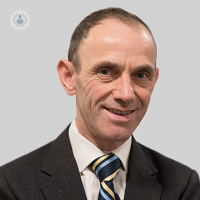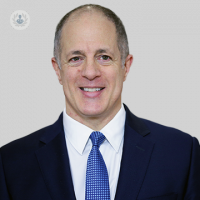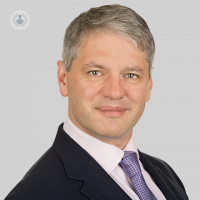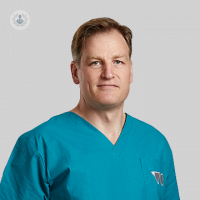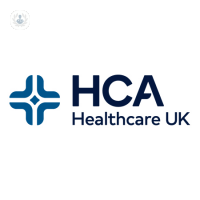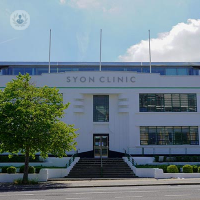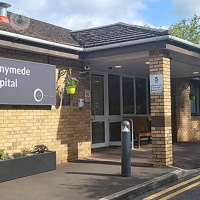What are spider veins (thread veins)?
Spider veins, also known as thread veins, are milder versions of varicose veins and are smaller, red and blue blood vessels that are visible on the surface of the skin. Their appearance resembles a spider’s web or tree branches. You will usually have them on your legs and face and they are more common in women than in men.
A vascular surgeon, dermatologist or aesthetic medicine specialist would treat spider veins.

Symptoms of spider veins:
Spider veins are usually symptomless and don’t pose a health problem, however, sometimes you might experience itchiness.
What are the causes of spider veins?
Spider veins develop when the valves in your leg veins weaken, allowing blood to flow backwards. Spider veins appear blue because the blood in them is deoxygenated. There are several factors that increase your risk of developing spider veins, including:
- Age
- Pregnancy
- Use of oral contraceptives
- Family history
- Obesity
- Sex – women are more likely to have spider veins.
- Standing up or sitting down for long periods.
Can spider veins be prevented?
Spider veins are not completely preventable, but measures to improve blood circulation can reduce the chances of them developing. The following will help:
- Maintaining a healthy weight
- Exercising regularly
- Eating a low sodium diet with lots of fibre
- Take breaks when sitting or standing for long periods
- Avoid tight trousers and high heels
Treatments for spider veins:
Taking measures to improve blood circulation and healthy lifestyle measures are the main methods of improving or reducing the number of spider veins you have and treatments or surgery are usually reserved for larger varicose veins that are either not aesthetically pleasing or have painful symptoms.
01-27-2017 12-05-2023
Spider veins (thread veins)
Mr David Greenstein - Vascular surgery
Created on: 01-27-2017
Updated on: 12-05-2023
Edited by: Kate Forristal
What are spider veins (thread veins)?
Spider veins, also known as thread veins, are milder versions of varicose veins and are smaller, red and blue blood vessels that are visible on the surface of the skin. Their appearance resembles a spider’s web or tree branches. You will usually have them on your legs and face and they are more common in women than in men.
A vascular surgeon, dermatologist or aesthetic medicine specialist would treat spider veins.

Symptoms of spider veins:
Spider veins are usually symptomless and don’t pose a health problem, however, sometimes you might experience itchiness.
What are the causes of spider veins?
Spider veins develop when the valves in your leg veins weaken, allowing blood to flow backwards. Spider veins appear blue because the blood in them is deoxygenated. There are several factors that increase your risk of developing spider veins, including:
- Age
- Pregnancy
- Use of oral contraceptives
- Family history
- Obesity
- Sex – women are more likely to have spider veins.
- Standing up or sitting down for long periods.
Can spider veins be prevented?
Spider veins are not completely preventable, but measures to improve blood circulation can reduce the chances of them developing. The following will help:
- Maintaining a healthy weight
- Exercising regularly
- Eating a low sodium diet with lots of fibre
- Take breaks when sitting or standing for long periods
- Avoid tight trousers and high heels
Treatments for spider veins:
Taking measures to improve blood circulation and healthy lifestyle measures are the main methods of improving or reducing the number of spider veins you have and treatments or surgery are usually reserved for larger varicose veins that are either not aesthetically pleasing or have painful symptoms.


Varicose vein treatment: three reasons why treatment fails
By Dr Omar Abu-Bakr
2024-11-21
Varicose veins, swollen veins which are dark blue or purple in colour, can affect people's confidence and make them self-conscious. Treatment is widely available but unfortunately is not always successful and can leads to recurrence of the varicose veins. In this article, renowned consultant venous surgeon, Dr Omar Abu-Bakr explains why this can occur and what patients can expect from high quality treatment. See more
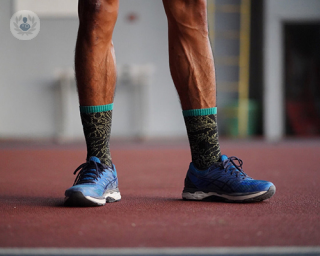

Should I be concerned about my varicose veins?
By Mr S. Tawqeer Rashid
2024-11-20
Varicose veins are very common and whilst they are mostly not problematic, sometimes they can lead to occasional health issues. Mr S. Tawqeer Rashid, an experienced vascular surgeon, tells us exactly what risks are associated with varicose veins, and when you should seek medical advice or treatment. See more
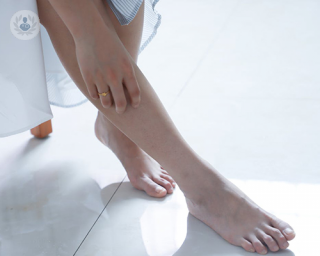

What are spider veins?
By Mr Ian Franklin
2024-11-20
Spider veins (also known as thread veins) are small pink or purple visually prominent blood vessels seen most often on the lower limbs, but they can occur on any part of the body. Mr Ian Franklin, an experienced vascular surgeon, explains what spider veins are, their causes, and how they can be treated. See more
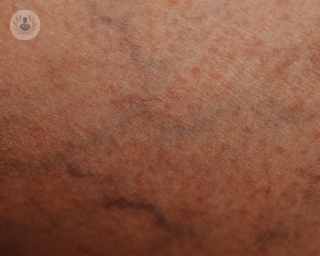

Understanding the causes of spider veins
By Mr Alastair Lewis
2024-11-19
Spider veins, which are medically known as telangiectasia or thread veins, are a common vascular condition. They affect a wide range of individuals. Leading venous surgeon Mr Alastair Lewis explores the causes of spider veins, offering insights to help you better understand this condition in this informative article. See more
Experts in Spider veins (thread veins)
-
Mr Philip Coleridge Smith
Vascular surgeryExpert in:
- Deep vein thrombosis (DVT)
- Spider veins (thread veins)
- Thrombosis
- Varicose veins
- Venous ulcer
- Venous insufficiency
-
Mr Ian Franklin
Vascular surgeryExpert in:
- Deep vein thrombosis (DVT)
- Leg ulcers
- Spider veins (thread veins)
- Varicose veins
- Lymphoedema
- Pelvic congestion syndrome
-
Professor Mark Whiteley
Vascular surgeryExpert in:
- Foam sclerotherapy
- Phlebectomy
- Endovenous laser treatment (EVLA)
- Spider veins (thread veins)
- Pelvic congestion syndrome
- Varicose veins surgery
-
Professor Stephen Black
Vascular surgeryExpert in:
- Deep vein thrombosis (DVT)
- May-Thurner syndrome
- Post-thrombotic syndrome
- Varicose veins
- Spider veins (thread veins)
- Varicose veins surgery
-
Mr David Greenstein
Vascular surgeryExpert in:
- Varicose veins
- Spider veins (thread veins)
- Pelvic congestion syndrome
- Deep vein thrombosis (DVT)
- Hand veins
- Swollen legs
- See all

The Wellington Hospital - part of HCA Healthcare
The Wellington Hospital - part of HCA Healthcare
Wellington Hospital South Bldg, 8A Wellington Pl, NW8 9LE
No existe teléfono en el centro.
By using the telephone number provided by TOP DOCTORS, you automatically agree to let us use your phone number for statistical and commercial purposes. For further information, read our Privacy Policy
Top Doctors

Syon Clinic - part of Circle Health Group
Syon Clinic - part of Circle Health Group
941 Great West Rd, Brentford TW8 9DU
No existe teléfono en el centro.
By using the telephone number provided by TOP DOCTORS, you automatically agree to let us use your phone number for statistical and commercial purposes. For further information, read our Privacy Policy
Top Doctors

The Runnymede Hospital - part of Circle Health Group
The Runnymede Hospital - part of Circle Health Group
Guildford Street, Ottershaw, Lyne, Chertsey KT16 0RQ
No existe teléfono en el centro.
By using the telephone number provided by TOP DOCTORS, you automatically agree to let us use your phone number for statistical and commercial purposes. For further information, read our Privacy Policy
Top Doctors
-
The Wellington Hospital - part of HCA Healthcare
Wellington Hospital South Bldg, 8A Wellington Pl, NW8 9LE, Central LondonExpert in:
- Digestive
- Cardiology
- Orthopaedic surgery
- Orthopaedic spinal surgery
- Intensive care
- Spine
-
Syon Clinic - part of Circle Health Group
941 Great West Rd, Brentford TW8 9DU, West LondonExpert in:
- Allergies nose and ears
- Allergy Dermatitis
- Allergy
- Clinical analysis
- Anxiety
- Digestive
-
The Runnymede Hospital - part of Circle Health Group
Guildford Street, Ottershaw, Lyne, Chertsey KT16 0RQ, ChertseyExpert in:
- Cardiology
- Hand surgery
- General Surgery
- Maxillofacial Surgery
- Oral surgery
- Orthopaedic surgery
- See all
- Most viewed diseases, medical tests, and treatments
- Hormone therapy
- Migraine
- Autoimmune diseases
- Nutrition
- Weight loss injections
- Endermologie
- Polynucleotides
- Nipple discharge
- Abdominal pain
- Endovenous laser treatment (EVLA)
